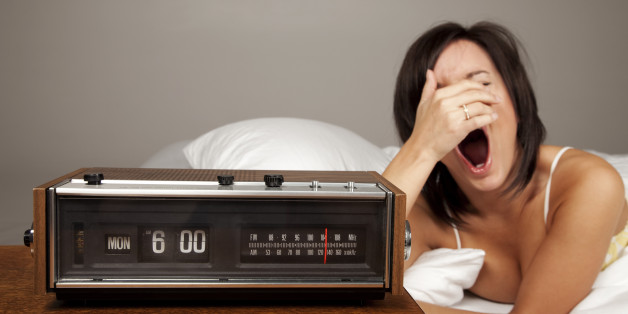
Did you know that staying up just an hour or two later on the weekend can wreak havoc on your sleep, not to mention your mood? There’s even a name for it: social jet lag.
According to Shelby Freedman Harris, YouBeauty Sleep Expert and director of Behavioral Sleep Medicine at Montefiore Medical Center in New York City, social jet lag is becoming more prevalent. “It isn’t necessarily a sleep disorder that we would actually diagnose someone with clinically, but it is a trend where we notice that people aren’t sticking with the same sleep-wake schedule every day,” Harris explains.
And that comes with a price: Staying out until the wee hours Friday and Saturday nights and then sleeping in both days can throw our body clocks out of whack. So much so that we can have trouble adjusting to our “regular” sleep time when it’s Sunday night, leaving us dragging and grumpy the next day.
All of this happens because we’re messing with our circadian rhythm — that internal body clock that governs our sleep/wake times, as well as our appetite. Think of staying up past your usual bedtime as having a similar affect on your body as jet lag after traveling. You’re putting your body into a different time zone when you sleep late on Saturday and Sunday, according to Harris.
Come Sunday night, that confused internal clock has a tougher time readjusting to your normal weekday schedule and then hello, annoying Sunday night insomnia. “You eat on a different schedule on the weekends, exercise differently and get light exposure later — all of this delays the circadian rhythm,” adds Harris.
To get you back on track, here are some tips on reigning in social jet lag so you don’t pay the price Monday morning — or give up your girl’s night out:
1. Get a solid night’s sleep each night during the week. Avoid going into the weekend with a sleep debt. If you get a good night’s sleep during the week, a weekend deficit will be easier to handle.
2. Take a short nap. If it’s going to be a late night, take a short nap beforehand and the following day to help you recover. The key is to take a nap before 2 p.m. and limit it to 20 minutes so it won’t mess with your sleep that night.
3. Avoid sleeping in on both Saturday and Sunday. We know this is a tough one. Yes, it’s OK to nab an extra hour or two of precious shut-eye one of those weekend mornings, but sleeping in late on both Saturday and Sunday after staying out late both nights is a no-no, says Harris. Doing so can worsen the adjustment back to your regular sleep schedule come Sunday evening.
4. Get moving. Exercise will get your energy flowing after a night out, so force yourself to hit the gym or simply take a walk shortly after you wake up. You’ll be less likely to crawl back under the covers after breakfast.
5. Bathe yourself in sunlight. Get as much sun as possible in the morning. Open the curtains, eat breakfast by a window and then head outdoors. “Light helps to keep your circadian rhythm in check and it helps diminish melatonin levels — a hormone that makes you sleepy and comes out in darkness,” explains Harris.
6. Choose one night to booze. You’re better off hitting the sauce one night of the weekend instead of both, according to Harris. Going overboard on alcohol can worsen the quality of your sleep, leaving you even worse off than the social-jet-lag effect from sleeping in.
7. Cut off the flow of joe after 2 p.m. You already know that coffee is a great pick-me-up the next morning — and hey, it’s good for you. But don’t sip it all day long. Avoiding caffeine after 2 p.m. keeps it from interfering with your sleep that night.
The bottom line: Nobody expects you to ditch your social life, and catching an extra hour or two of shut-eye on the weekends isn’t the worst thing ever. “But if you are someone who has sleep problems on Sunday nights or during the workweek, keeping a more consistent wake time is really key,” advises Harris. “The bedtime is important, but waking up at the same time is even more important.”
Source: Huffington Post









Leave A Comment